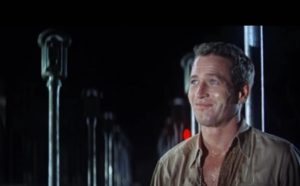Cool Hand Luke: Newman’s Double?
This post is part of Silver Screenings‘ and The Rosebud Cinema’s 1967 in Film Blogathon. Check out the other entries on their sites!
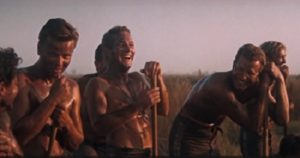
It’s not surprising, given the film’s condemnation of authority and celebration of rebellion, that Cool Hand Luke came out in 1967 in the midst of Vietnam War protests. Its depiction of the man “without eyes” and his fellow sadists is truly terrifying, as are the ominous parallels between the “failure to communicate” line the film popularized, and our muddy status in the war. The threat that the hero’s (seemingly) unflappable spirit poses to the guards’ squashing of the prisoners is evident to them—and us—from the start of the film. This guy (Paul Newman as Luke) makes prison fun instead of soul killing; clearly, the authorities will be seeking a way to destroy him.
What strikes me most about the movie is not its strong writing, or Newman’s compelling acting, or even George Kennedy’s perfect performance as Luke’s fan. It’s just how iconic of a Newman film it is. First, there’s that playfulness of Luke’s—from the speeding up of the road crew work, to bluffing at poker, to eating 50 eggs on a dare. Sounds like a Newman role, right? Like Butch Cassidy, like Henry Gondorff in The Sting…And like the actor himself, who was known for pranks. See this hysterical comparison of his and George Clooney’s.
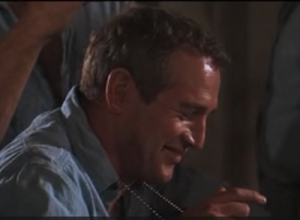
Then there’s that complicated reaction to popularity. On the one hand, Luke relishes the attention; he likes to lead, rebel. He wants to inspire the men out of their lethargy, to make them fight for themselves. He’s found a way to introduce joy into prison life, and he wants that influence to spread.
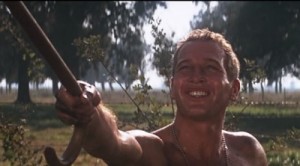
But Luke’s resistance to idolization increases as his situation worsens. The more he’s thrown in the hold and beaten for being a “hard case,” the more he resists the simple hero worship of his companions, lashing out at the amount of pressure they’ve put on him: “Oh, come on! Stop beatin’ it. Get out there yourselves. Stop feeding on me!”
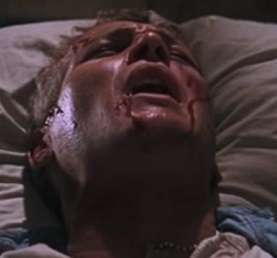
In other words, inspiration he’ll provide. But if they’re content with just the stories about him and his cool demeanor, well, that’s something else entirely. How can he make a difference, if he’s the only ornery one who resists?
Again, the story makes me think of Newman the man, of the fame he used to spread the news about his philanthropies, including the moving Hole in the Wall Gang Camp. And, of course, there’s that healthy food that’s become—for some—more influential than his films.
I know Cool Hand Luke was just a part, that I should not conflate the man and the role. But it seems to me the two shared some traits, including a kind of impatience with the slow progress of the rest of us, our hesitation to do the right thing (I always thought this impatience was the reason for his flippant comment about his marital fidelity: “Why fool around with hamburger when you have steak at home?”)
Sure, model me, Newman might say. Watch me if you must. (And doesn’t it always seem as if this stunningly handsome man resists our gaze, takes it as suffering he has to endure for his art? How compelling is a star who seems too cool to notice his own looks?) Ask for my photograph if you feel like it, get my signature.
But get out there and do something yourself.

